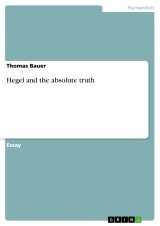Details

Hegel and the absolute truth
1. Auflage
|
13,99 € |
|
| Verlag: | Grin Verlag |
| Format: | EPUB, PDF |
| Veröffentl.: | 04.01.2007 |
| ISBN/EAN: | 9783638584173 |
| Sprache: | englisch |
| Anzahl Seiten: | 11 |
Dieses eBook erhalten Sie ohne Kopierschutz.
Beschreibungen
Essay from the year 2005 in the subject Philosophy - Philosophy of the 17th and 18th Centuries, grade: A (1,3), University of Auckland (Department of Philosophy), course: Lecutre, language: English, abstract: “Quid est veritas?” It was not a philosopher who asked this important question. Pontius Pilatus, a roman prefect inquired one of the most important questions in philosophy. For Plato, a sentence is true if it says from whom it exists, that it exists. After Aristotle something becomes true not because we are thinking about it, we are thinking about it because it is true. For Augustine truth is, “quod ita est, ut videtur“(De vera relig. 36). The truth is eternal, timeless, non versatile and absolute. In the Scholastic, philosophers defined the truth as: adaequatio rerum et intellectuum. In the summa contra gentiles (I, 59.), Thomas Aquinas tells us : ”Veritas intellectus est adaequatio intellectus et rei, secundum quod intellectus dicit esse quod est, vel non esse quod non est.” For Descartes, the eternal truths of the mathematicians are given us by God, the truths are timeless and absolute but they can not exist outside our thoughts: “Aeternas veritates - nullam existentiam extra cogitationem nostram habentes” (Pr.ph. I, 48). Leibnitz tells us that the truth exists out of correspondence between the propositions with the things. The truth for Kant is a correspondence among the thoughts which correspond with the regulars of the mind. The eternal truth is turned into an a priority judgment. Now, we can not talk anymore of adaequatio rerum et intellectum, because the thing in itself can not be perceived anymore. Kant drew out the limits of our mind and because of this we can not have a knowledge of the absolute truth. Goethe now gives us a relative point of view: everyone can have his own truth: “Kenne ich mein Verhältnis zu mir selbst und zur Außenwelt, so heiße ich's Wahrheit. Und so kann jeder seine eigene Wahrheit haben, und es ist doch immer dieselbige“( WW. XIX, 53). Since Kant, the knowledge of the absolute truth is not available anymore, but there is a well known Philosopher, who wants to teach us that we can have a knowledge of the absolute truth. For Georg Wilhelm Friedrich Hegel, to seek the truth, to come to a knowledge of the absolute truth is the duty of a philosopher. In his first lecture at the University of Berlin, Hegel laments: “So ist das, was von jeher für das Schmählichste und Unwürdigste gegolten hat, der Erkenntnis der Wahrheit entsagen, vor unsern Zeiten zum höchsten Triumphe des Geistes erhoben worden.“
In this essay, I will try to show why Hegel believes that we can have knowledge of the absolute truth.
In this essay, I will try to show why Hegel believes that we can have knowledge of the absolute truth.

















